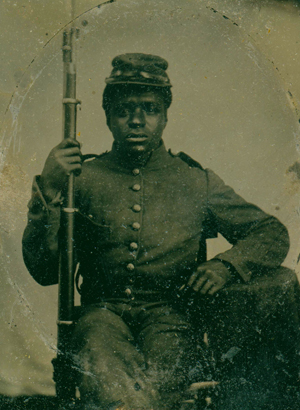|
The Proclamation and Black Troops |
|

|
|
A black soldier in the Union Army, tintype. |
One of the more controversial and successful aspects of the Proclamation was its support of black troops. Lincoln declared that “such persons of suitable condition will be received into the armed service of the United States to garrison forts, positions, stations, and other places, and to man vessels of all sorts in said service.” The Proclamation’s impact manifested itself immediately. Black men, at last fighting for their own liberation, redoubled their efforts to join the army. The military finally accepted them, abandoning the notion that the conflict was “a white man’s war.” Nearly a year after the Proclamation, Lincoln reported in his December 8, 1863 State of the Union message that close to 100,000 black troops had joined the Union Army and Navy. Almost half were soldiers or sailors in arms. “So far as tested, it is difficult to say they are not as good soldiers as any,” Lincoln reported. He was also quick to allay early fears of the Proclamation’s opponents: “No servile insurrection or tendency to violence or cruelty has marked the measures of emancipation and arming the blacks.” Moreover, the move had been watched internationally, and debated at length inside the United States. Foreign relations had much improved since emancipation, and results of the intervening election had been “highly encouraging,” confirming that emancipation had brought a “new reckoning” to the United States. None of the dire consequences predicted had occurred, and the “crisis which threatened to divide the friends of the Union” was past.
As the Union Army advanced through the South, Lincoln again noted the changed condition of the military in his 1864 message to Congress: “thousands, white and black, join us as the national arms press back the insurgent lines.” By some estimates, 300,000 African Americans fought for the Union between 1863 and 1865. By war’s end, they made up ten percent of federal forces and performed key roles in the Union victory. Military service also provided crucial support to future claims of citizenship, although African Americans’ battle for full military participation, with equal wages and opportunities, was yet to be won. Still, this provision of the Emancipation Proclamation marked an important new stage in the evolution of Abraham Lincoln—and the nation.
Next Page: The Political Risk of Emancipation
|